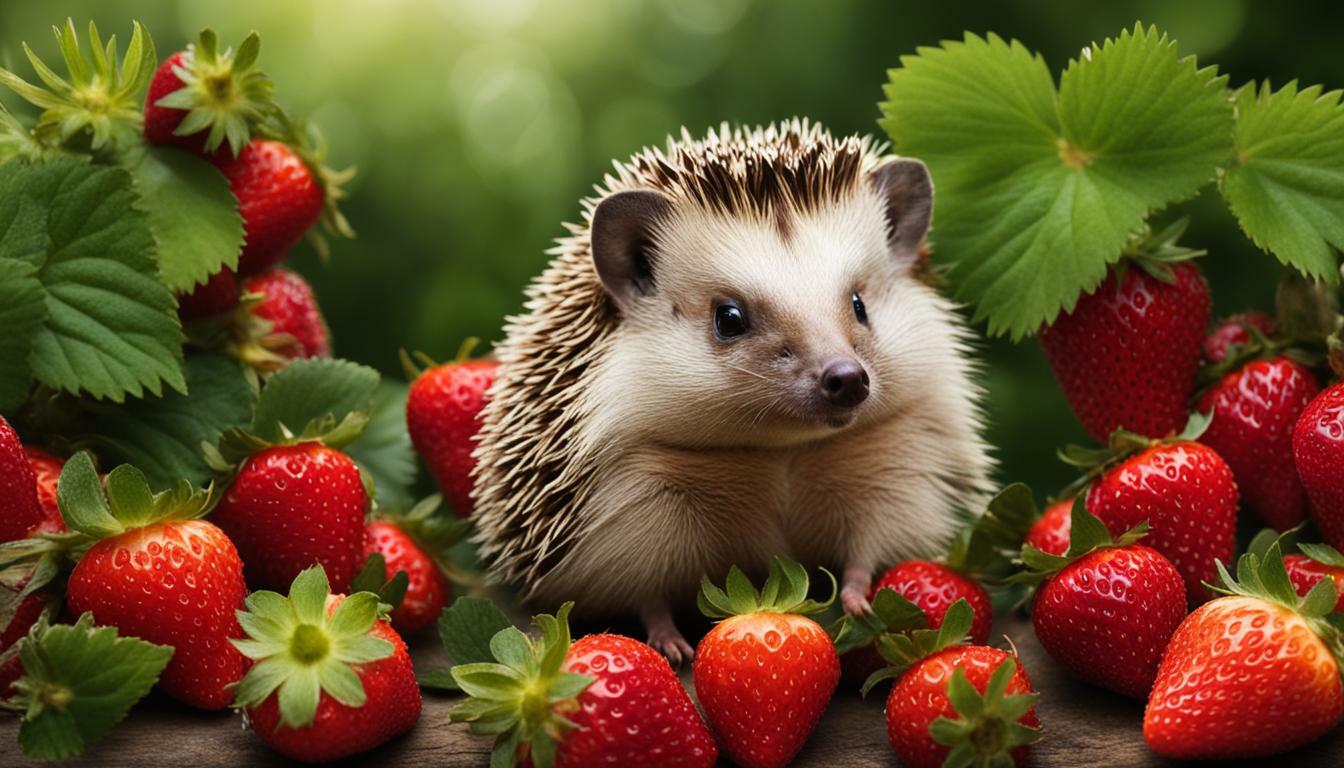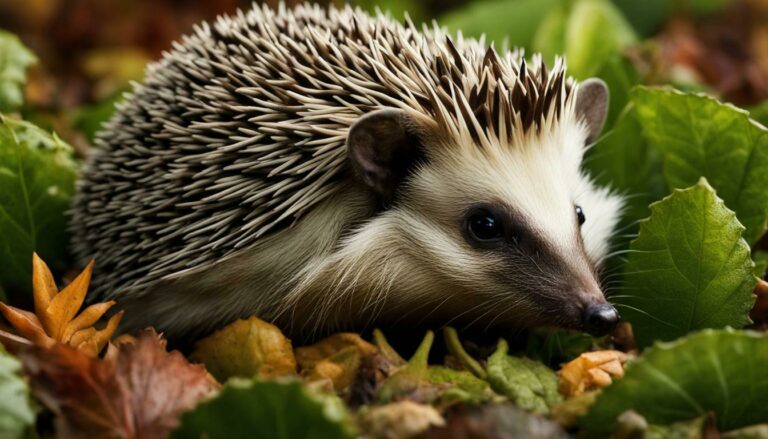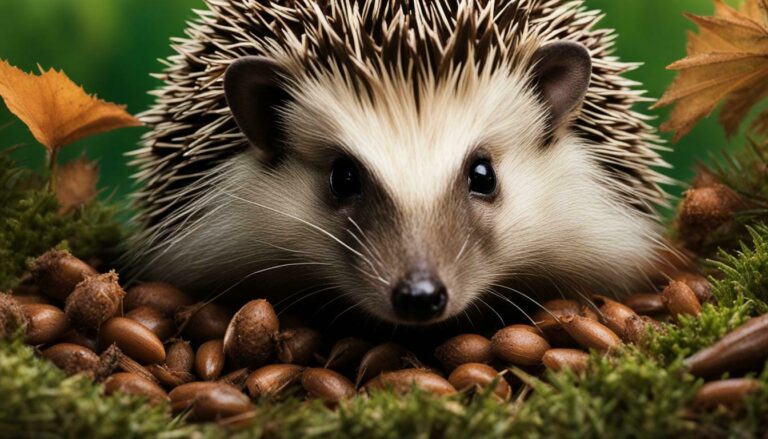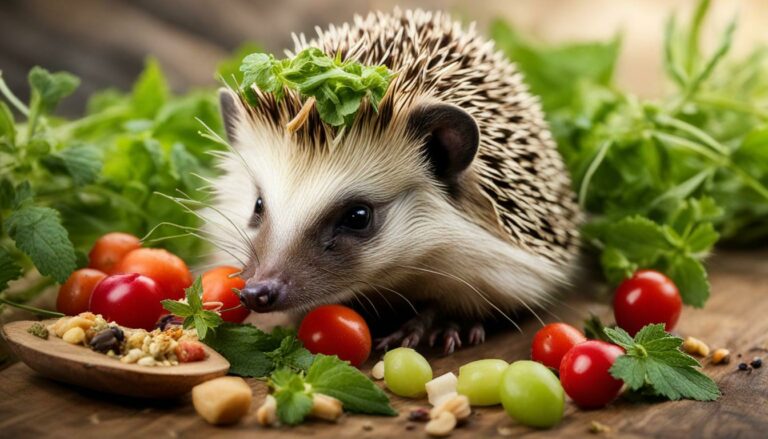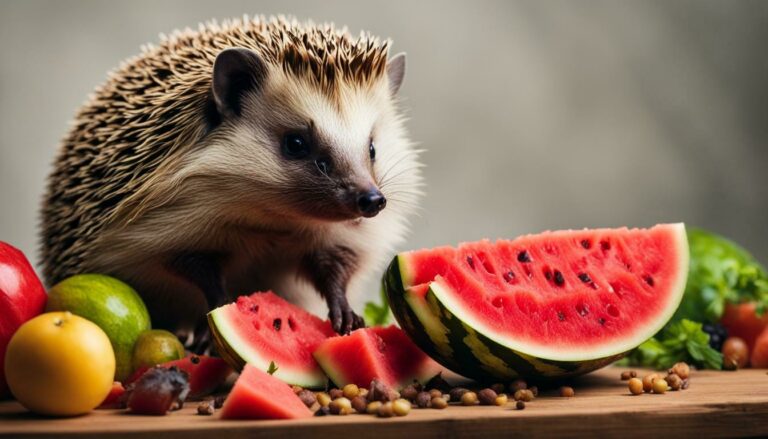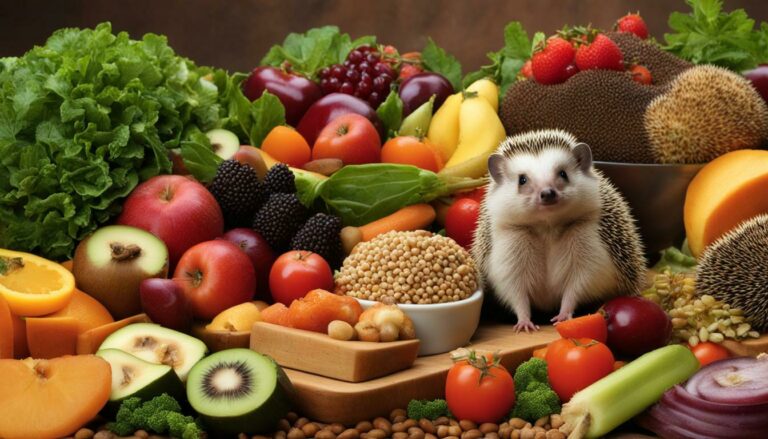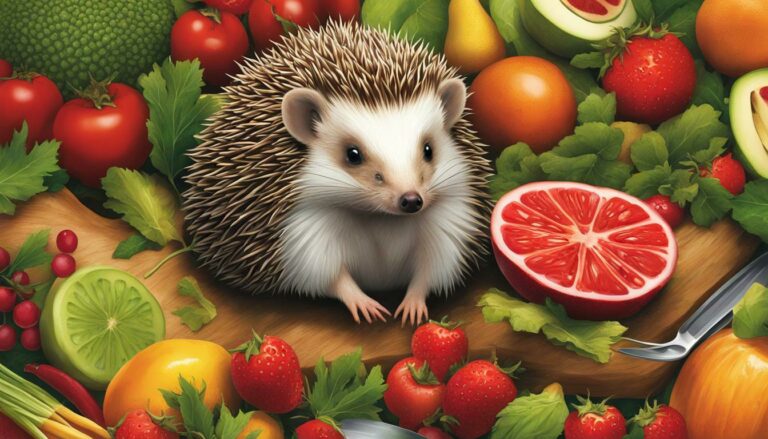Can Hedgehogs Eat Strawberries? – Essential Feeding Tips
Key Takeaways:
- Hedgehogs are known for their unique diet, but can they enjoy the sweet taste of strawberries?
- Strawberries should be added to a balanced diet and fed as a treat due to their unbalanced calcium to phosphorus ratio.
- Strawberries are high in vitamin C and fiber, but they should be fed in moderation due to their sugar content.
- Offer strawberries to your hedgehog 1-2 times per week, considering their overall diet and other fruits they may be consuming.
- Choose organic strawberries to avoid pesticides and herbicides that can be harmful to your hedgehog’s health.
- When preparing strawberries, wash them thoroughly and remove any chemicals or contaminants before feeding them to your hedgehog.
Hedgehogs’ Natural Diet and Nutritional Needs
In the wild, hedgehogs primarily feast on a variety of insects and occasionally indulge in fallen fruits like strawberries. Their diet consists mainly of insect-based proteins, which they obtain by consuming both soft-bodied and hard-bodied insects such as worms, beetles, earwigs, millipedes, and caterpillars. They also supplement their diet with small mammals like frogs, baby birds, and their eggs, as well as fallen fruits from bushes and vines, such as peaches, berries, apples, and pears.
Approximately 80% of a hedgehog’s diet should consist of protein, while the remaining 20% should come from plants, including daisy, dandelion, and yarrow. Fruits that have fallen from bushes or vines can also be included in their diet. However, it’s important to note that hedgehogs find it difficult to digest vegetable fibers, so their primary focus should be on consuming insects and meat. They should only consume plant matter when it is available.
In captivity, hedgehogs can be fed a diet that consists of commercial hedgehog foods, which provide a balanced combination of proteins, carbohydrates, and fats similar to what they would consume in the wild. These commercial diets can be supplemented with gut-loaded feeder insects, such as crickets and mealworms, which can be found at exotic pet stores. Boiled eggs, soft-bodied fruits, and fresh vegetables can also be offered as dietary supplements. It’s important to calculate the nutritional content of their pellet diet and ensure that it includes insects and meat as the primary ingredients.
While hedgehogs can eat fruits, including strawberries, it should be done in moderation. Fruits provide small traces of nutrients, such as vitamin A, vitamin C, and antioxidants, known as polyphenols. Hedgehogs may actively seek out fruits in the wild and can benefit from incorporating them into their captive diet, but it’s important to remember that they are not designed to digest plants, including fruits and vegetables. Feeding hedgehogs an excess of sugary fruits can do more harm than good. Strawberries, along with other berries and pip fruits like raspberries, blueberries, mangoes, bananas, and peaches, make popular sugary snacks for captive hedgehogs, but they should be fed sparingly and in combination with other fruits.
| Fruit | Calcium (mg/100g) | Phosphorus (mg/100g) |
|---|---|---|
| Strawberries | 16 | 24 |
| Apples | 3 | 11 |
| Bananas | 5 | 22 |
Recommended Greens with a Healthy Calcium to Phosphorus Ratio:
- Kale: 150mg calcium, 60mg phosphorus
- Collard Greens: 210mg calcium, 63mg phosphorus
- Mustard Greens: 198mg calcium, 59mg phosphorus
- Dandelion Greens: 187mg calcium, 66mg phosphorus
- Spinach: 99mg calcium, 49mg phosphorus
Feeding Hedgehogs in Captivity
When it comes to feeding hedgehogs in captivity, a balanced diet is key, but strawberries can be a tasty addition if given in moderation. Hedgehogs are primarily insectivores in the wild, with their diet consisting mainly of insects and some plant material. However, in captivity, it is important to provide them with a variety of foods to ensure they are getting all the necessary nutrients.
Commercial hedgehog foods can be a convenient option as they are specially formulated to meet the nutritional needs of hedgehogs. These foods usually come in pellet form and provide a good balance of proteins, carbohydrates, and fats. However, it is important to supplement these foods with additional sources of nutrition.
Supplementing a hedgehog’s diet in captivity can include offering gut-loaded feeder insects like crickets and mealworms, as well as boiled eggs, soft-bodied fruits, and fresh vegetables. These additional foods help provide the necessary vitamins and minerals that may be lacking in commercial hedgehog foods. It is important to calculate the nutritional content of the pellet diet and ensure that any supplements are added in appropriate quantities.
| Safe Foods for Hedgehogs: | Avoid Foods for Hedgehogs: |
|---|---|
|
|
Feeding strawberries to hedgehogs can be a good source of nutrients and antioxidants, but it should be done in moderation. Strawberries are high in vitamin C and fiber, which are beneficial for hedgehogs. However, they also have a high sugar content and an unbalanced calcium to phosphorus ratio, which can be problematic if fed in excess.
It is important to offer strawberries as a treat rather than a staple food in a hedgehog’s diet. They should be given in small quantities and not too frequently to prevent digestive issues and potential weight gain. It is also important to choose organic strawberries to avoid pesticides and chemicals that can be harmful to hedgehogs.
In conclusion, while strawberries can be a tasty addition to a hedgehog’s diet in captivity, they should be fed in moderation. Offering a balanced diet that includes commercial hedgehog foods, supplemented with safe fruits and vegetables, ensures that hedgehogs receive all the necessary nutrients for their overall health and well-being.
Can Hedgehogs Eat Strawberries? Pros and Cons
Feeding your hedgehog strawberries has its advantages, but it’s important to consider the potential drawbacks as well. Strawberries offer several benefits for hedgehogs in terms of their nutritional content. They are high in vitamin C, which is important for growth, repair, and immune function. Strawberries also provide dietary fiber, aiding in digestion and the formation of healthy stools. Additionally, they have a relatively low sugar content compared to other fruits, making them a healthier option as a treat.
On the other hand, it’s crucial to be aware of the unbalanced calcium to phosphorus ratio in strawberries. Hedgehogs require a balance between these two minerals, with an ideal ratio of 1:1 to 2:1. Strawberries have a higher phosphorus content than calcium, which means they should be fed in moderation. Too much phosphorus in a hedgehog’s diet can lead to imbalances and potential health issues.
Another consideration is the potential digestive issues that strawberries can cause. Hedgehogs struggle to digest the cellulose in plant matter, including fruits, which can result in gastrointestinal problems such as diarrhea. It’s important to introduce strawberries gradually and monitor your hedgehog’s response. If you notice any digestive issues, it may be best to limit or eliminate strawberries from their diet.
Pros:
- Source of antioxidants
- Part of a hedgehog’s natural diet
- High in vitamin C
- Sweet taste that hedgehogs enjoy
- Lower sugar content than other fruits
- Replenishes minerals
- Helps combat minor dehydration symptoms
Cons:
- Difficult to digest
- Dried strawberries are too sugary
- Not ideal as a daily food replacement
- Must be fed in combination with other fruits
- May cause gastrointestinal issues
In conclusion, while strawberries can be a tasty and nutritious treat for hedgehogs, they should be fed in moderation due to their unbalanced calcium to phosphorus ratio and potential digestive issues. It’s important to prioritize a balanced diet for your hedgehog and consult with a veterinarian to ensure their nutritional needs are met.
Recommendations and Precautions for Feeding Strawberries to Hedgehogs
To ensure your hedgehog’s safety and enjoyment, follow these recommendations and precautions when incorporating strawberries into their diet.
- Feed strawberries as an occasional treat: While strawberries can be a tasty and nutritious addition to your hedgehog’s diet, it’s important to remember that they should be given in moderation. Due to the unbalanced calcium to phosphorus ratio and sugar content, it’s best to offer strawberries as a treat no more than 1-2 times per week.
- Choose organic strawberries: Whenever possible, opt for organic strawberries to minimize exposure to pesticides and other chemicals. Organic strawberries are generally healthier and safer for your hedgehog.
- Prepare strawberries properly: Before feeding strawberries to your hedgehog, make sure to wash them thoroughly to remove any dirt or potential contaminants. Cut the strawberries into small, bite-sized pieces to prevent choking and remove any stems or leaves.
- Variety is key: While strawberries can be enjoyed by hedgehogs, it’s important to offer a balanced and varied diet. Along with strawberries, incorporate other safe fruits and vegetables into your hedgehog’s diet, such as apples, bananas, blueberries, and melons. This will ensure they receive a wide range of nutrients.
- Observe your hedgehog’s reaction: Every hedgehog is unique, and some may have sensitivities or allergies to certain foods. Monitor your hedgehog’s behavior and digestive health after introducing strawberries to their diet. If you notice any adverse reactions, such as diarrhea or vomiting, discontinue feeding strawberries and consult with a veterinarian.
Table: Safe Varieties of Strawberries for Hedgehogs
| Safe Strawberry Varieties | Unsafe Strawberry Varieties |
|---|---|
| Honeoye | Mock Indian Strawberry |
| Ozark Beauty | N/A |
| Chandler | N/A |
| Tristar | N/A |
| Seascape | N/A |
| Jewel | N/A |
| Earliglow | N/A |
Remember to always prioritize your hedgehog’s overall diet and provide a variety of foods that meet their nutritional needs. By following these recommendations and precautions, you can safely incorporate strawberries into your hedgehog’s diet for a delightful and nutritious treat.
Conclusion
In conclusion, hedgehogs can enjoy strawberries as a treat, but it’s crucial to prioritize a balanced diet to keep them healthy and happy. While strawberries provide some nutritional benefits such as vitamin C and fiber, they also have a poor calcium to phosphorus ratio. Therefore, it’s important to feed strawberries in moderation and ensure that the majority of your hedgehog’s diet consists of protein-rich foods and vegetables.
Feeding your hedgehog a commercial hedgehog food that is nutritionally balanced is a good starting point. However, it’s also important to supplement their diet with gut-loaded feeder insects, boiled eggs, and fresh vegetables. Adding a small amount of strawberries or other fruits can provide additional nutrients and variety to their diet.
When feeding strawberries to your hedgehog, it’s recommended to offer them as a treat no more than 1-2 times per week. It’s also important to choose organic strawberries to avoid any potential exposure to pesticides and chemicals. Additionally, it’s crucial to cut the strawberries into small pieces to minimize the risk of choking.
Remember, a balanced diet is key for the overall health and well-being of your hedgehog. Along with providing proper nutrition, always observe your hedgehog’s behavior and consult with a veterinarian for any specific dietary recommendations or concerns.
FAQ
Q: Can hedgehogs eat strawberries?
A: Yes, hedgehogs can safely eat strawberries as part of a balanced diet. However, strawberries should be offered as a treat and not as a main food source.
Q: What are the nutritional benefits of strawberries for hedgehogs?
A: Strawberries are high in vitamin C, which is important for growth, repair, and immune system health. They also provide fiber, which aids in digestion, and have a lower sugar content compared to other fruits.
Q: How often should I feed strawberries to my hedgehog?
A: It is recommended to offer strawberries to your hedgehog around 1-2 times per week. This frequency should be adjusted based on the overall balance of your hedgehog’s diet and the presence of other fruits with unbalanced calcium to phosphorus ratios.
Q: Are there any precautions when feeding strawberries to hedgehogs?
A: Yes, strawberries have an unbalanced calcium to phosphorus ratio, which can be an issue if fed too frequently. It is also important to choose organic strawberries to avoid pesticides and wash them thoroughly before feeding.
Q: Can all types of strawberries be fed to hedgehogs?
A: Most varieties of strawberries found in grocery stores are safe for hedgehogs. However, if you are picking strawberries from a bush or vine, ensure they have not been exposed to chemicals or contaminants.
